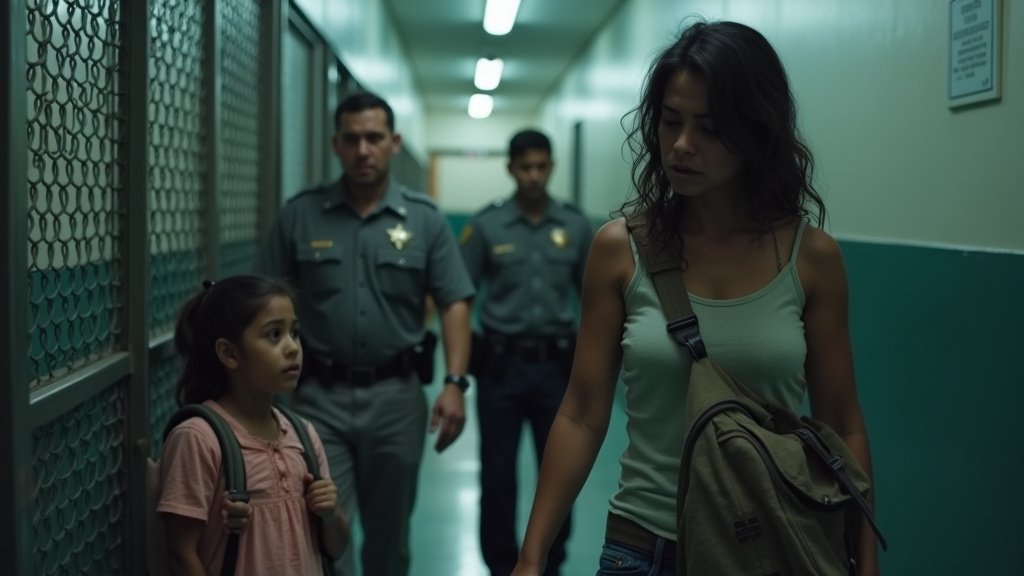NEW YORK – A 6-year-old girl, her mother, and her 19-year-old brother were detained by United States Immigration and Customs Enforcement (ICE) agents in Lower Manhattan this week, sparking immediate outcry from advocates and public officials. The family, identified as Martha, her daughter Dayra, and her son Manuel, had reportedly fled violence in Ecuador and entered the U.S. illegally in December 2022. They had previously received final orders of removal from an immigration judge, a key detail cited by the Department of Homeland Security (DHS) in a statement following their apprehension.
Routine Check-in Ends in Family Separation
The detention occurred after what was described as a routine immigration hearing at 26 Federal Plaza. Instead of returning home, Martha, Dayra, and Manuel were taken into ICE custody. The apprehension quickly led to the separation of the family, a consequence that immigration advocates warn has severe emotional and psychological impacts. Martha and young Dayra were transported to the South Texas Family Residential Center in Dilley, Texas, while Manuel was transferred to the Delaney Hall detention facility in Newark, New Jersey.
Dayra, at just six years old, is believed to be the youngest city public school student to be detained by ICE in New York City this year, marking at least the fourth such incident involving a public school student. The principal of P.S. 89 in Queens, where Dayra attended, expressed profound concern about the disruption to her education and the potential emotional trauma inflicted on her and her classmates.
Advocacy and Community Response
Grassroots organizations, notably Mi Tlalli, have swiftly mobilized to advocate for the family’s release. Mariposa Benitez, a founder of Mi Tlalli and a licensed clinical social worker, underscored the devastating mental health consequences of family separation, stating that individuals may take many years to recover. Loved ones, including another of Martha’s sons living in Queens, have expressed feelings of helplessness and profound loss over the unexpected detention of his mother and siblings. Martha’s boyfriend also relayed her fears of deportation and the dangers, including gang violence, that await them back in Ecuador.
Local political leaders, including NYC Councilmember Shekar Krishnan and Assemblywoman Catalina Cruz, have condemned the detentions, questioning the federal government’s stated focus on targeting criminals when families and young children are being swept into the Immigration enforcement system. This news has ignited further debate on the methods and priorities of ICE operations.
Expanding Detention Capacity and Policy Implications
This incident unfolds amidst a broader context of expanding Immigration detention infrastructure across the United States. The South Texas Family Residential Center in Dilley, a facility with a capacity for up to 2,400 individuals, was recently reopened by CoreCivic under an agreement with ICE, signaling a renewed emphasis on family detention. This move reverses a previous decision by the Biden administration to close the facility due to high operating costs. Similarly, the Delaney Hall facility in Newark, a 1,000-bed center operated by the GEO Group, reopened in May 2025, significantly increasing ICE’s capacity in the Northeast region. Its reopening has faced considerable opposition, including legal challenges from Newark Mayor Ras Baraka.
Internal ICE documents reportedly indicate plans to significantly increase overall detention capacity, potentially nearly doubling it by 2026, with a focus on new or expanded family detention centers. This strategic expansion suggests an intent to increase the rate of deportations involving parents and their children. While ICE has an internal directive (11064.4, issued July 2, 2025) concerning the “Detention and Removal of Alien Parents and Legal Guardians of Minor Children”—aimed at minimizing infringement on parental rights—its nature as internal policy means it can be modified. Critics argue that the practice of family detention, despite adherence to the Flores Settlement, which generally limits child detention to 20 days, inflicts long-term psychological harm.
The Human Cost of Enforcement
The detention of Martha, Dayra, and Manuel serves as a stark reminder of the human element at the heart of Immigration policy and enforcement. For this family, fleeing violence only to face detention and separation, the future remains uncertain. Efforts by community advocates and legal teams continue, working tirelessly to secure their release and reunification, highlighting the profound personal stakes involved in the ongoing national conversation about Immigration.





